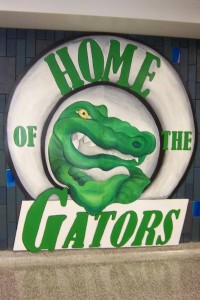June 27th, 2022
For Pride Month 2022, we are excited to share profiles of 2SLGBTQIA+ community members as a part of the series 2SLGBTQIA+ and living in Waterloo Region.
These 2SLGBTQIA+ community members share about their identities, passions, and lived experiences. These profiles offer advice to students, hope for the future of education and what it means to be queer.
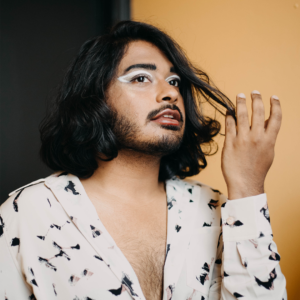
Image credit: Sacha Columbia
Aashay Dalvi
Tell us about yourself
“Queer – to be queer means to constantly challenge the binary and question the status quo. To be queer means to create a new way of functioning, a way that encourages an anti-oppressive mode of cohabitation. Queer means to live knowing that gender is a construct, knowing that sexuality is fluid and that identity is ever-evolving.”
What’s the best thing about being queer?
“There’s pride in being different. There’s power in being queer. You decide who you are, not the binary society. You decide!”
What advice would you offer to 2SLGBTQIA+ identifying youth?
“You are valid. Your identity is important. You deserve to experience joy and acceptance.”
What advice would you offer to non-2SLGBTQIA+ youth who want to create a safer space?
“It is extremely important for you to recognize and acknowledge your heteronormative privilege and challenge it to create space to validate and embrace and celebrate the identities of 2SLGBTQIA+ individuals.”
Did you have a favourite school staff member growing up, and why?
“No, I did not. Because my teachers did not teach us the harsh reality that we are all byproducts of colonisation and patriarchy regardless of the medium of instruction. Because my teachers, and educational system at large, removed the queer context from educational resources, be it in Hindu mythology or Emily Dickinson.”
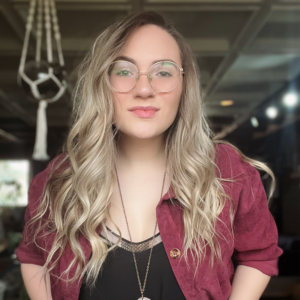
Abbi Longmire
Tell us about yourself
“I’m a neurodivergent, queer lesbian and a nonbinary woman. I spent so much of my life trying to be someone I wasn’t, and being undiagnosed I didn’t realize how much of myself was masking and mirroring to try and fit a mold. I thought there were rules for who I could be, but there is no ‘correct’ way to exist.”
What’s the best thing about being queer?
“My favourite thing about being queer is the community of found family we create.”
What advice would you offer to 2SLGBTQIA+ identifying youth?
“As cliché as it sounds, as long as you’re being kind to yourself and others, care less about what other people think. Don’t put energy into trying to be someone you’re not. Fill your life with people who like you for you, not for the you that you think they want you to be.”
What advice would you offer to non-2SLGBTQIA+ youth who want to create a safer space?
“Don’t make assumptions, there is always more to someone’s story than you realize. Don’t make the default ‘straight’. You can’t look at someone and know their gender. You don’t know what you don’t know, so always be open to listen and learn. No one can understand the world with their own experience alone.”
Did you have a favourite school staff member growing up, and why?
“I’m actually still in touch with quite a few teachers who were truly interested in getting to know students and creating real connections with them. My high school’s music teachers, especially, created a close-knit community and a safe space to spend any spare moment.”
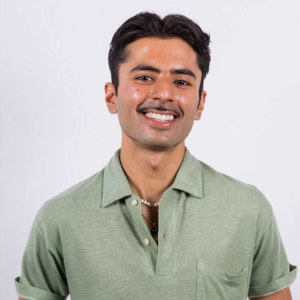
Kamil Ahmed
Queer and Muslim
Tell us about yourself
“Pakistani. Cis-man. Bisexual. Muslim. Immigrant. Queer. Canadian. Settler.
Each of these packed words are a part of who I am. Some were given to me, others came with time; but all of them have required deep and active reflection, unlearning and exploration to become parts of how I identify. To me, the pieces listed above can live in isolation from one another but make for a far more meaningful life when they live in harmony with one another.
I am a cis-man from Pakistan. I have to take stock of what that means and how culture affects me. I am bisexual and Muslim. That presents specific challenges for me. I am a Canadian from Pakistan. That shapes my story. I am a queer cis-man. That informs how I take up and create space. I am an immigrant settler. That influences how I choose to live, work and play on this land.”
What’s the best thing about being queer?
“That you can be exactly who you are, with all the messiness, and without feeling pressure to find a box to put yourself in or a label to wear. Historically, ‘queer’ was used negatively to describe people who are not heterosexual or are not cisgender as ‘strange’ or ‘peculiar’.
Since, we have reclaimed that term as a politically radical alternative to the sometimes limiting branches of the acronym. You’re invited to reclaim it for yourself.”
What advice would you offer to 2SLGBTQIA+ identifying youth?
“I don’t think I know you well enough (yet) to give you advice but I will offer you these sentiments:
Know that even when you may not be able to see it, you are worthy of life and joy. Know that your pain can be a powerful source for your purpose. Know that you possess the power to affect change in your life and those of others. Know that there is an abundance of people for you to look to for inspiration around how you can identify and exist. Know that there are people who see you, hear you and are waiting for you with open arms. Know that I am one of those people.”
What advice would you offer to non-2SLGBTQIA+ youth who want to create a safer space?
“No advice here either but instead, a few questions for you to reflect on:
Do you know someone who identifies as queer? If not, why? What does a safe space look like for you? How might it look different for someone who identifies as 2SLGBTQIA+? What do you think might be missing or harmful to folks with different needs than you in spaces you access? How do you want to participate in creating safe space? How can you show up in little but meaningful ways everyday to facilitate safe space? What does it mean to you to be a safe person?”
Did you have a favourite school staff member growing up, and why?
“When I look back on my time in school, I am reminded that I would not be here today as the person I am without the acknowledgement, mentorship and love of my teachers. I never had a teacher that looked or identified like me, but I was privileged to have strong allies as educators. I didn’t have very many friends or sources of support while I was in school and so some of the people closest to me were teachers, councilors and custodial staff.
These people created space for me to grapple with my pain, explore my purpose and share my burdens, even when they did not resemble their own. These people took me under their wings when I felt lost and alone, offering me understanding, direction and grace.”
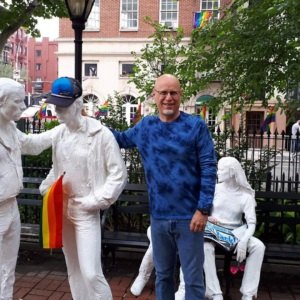
Mark Hartburg
Gay cisgender male
Tell us about yourself
“I am a wedding officiant that serves queer couples.
I came out late in life at age 57. It was the hardest, but yet best, decision I’ve ever made. I am thankful that my two daughters and grandson have been supportive of me as a queer person. I met my now husband in 2014 and married him in 2016.
I am a survivor of Conversion Practices and have been working to ban them on the federal, provincial and municipal level as well as support survivors and those at risk. I am a board member and volunteer for Spectrum Rainbow Community Space.”
What’s the best thing about being queer?
“Not being caught up in the heterosexual or cis world view. Being able to challenge hetero-cisnormativity and being able to be the unique person I am.”
What advice would you offer to 2SLGBTQIA+ identifying youth?
“Be and live who you are unapologetically – find, explore and celebrate the queer community. Be an ally to and an advocate for all queer people, not only those in your friend group.”
What advice would you offer to non-2SLGBTQIA+ youth who want to create a safer space?
“Live out, speak up, stand with those who are subject to repression and oppression. Confront discrimination even when it is happening to others and check your own privilege.”
Did you have a favourite school staff member growing up, and why?
“I was born in 1956. I sadly had no ‘out’ teachers in school. I wish I had had some role models.”
2SLGBTQIA+ and living in Waterloo Region
This is part three of our 2SLGBTQIA+ and living in Waterloo Region series for Pride Month 2022.
In case you missed it:
- Part One | 2SLGBTQIA+ and living in Waterloo Region
- Part Two | 2SLGBTQIA+ and living in Waterloo Region
Categories: Principal's Message
